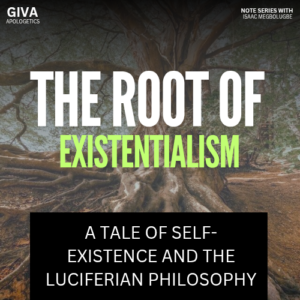
The Root of Existentialism: A Tale of Self-Existence and the Luciferian Philosophy
Isaac Megbolugbe
January 14, 2025
Introduction
Existentialism, a philosophical movement emphasizing individual freedom and choice, has its roots in the concept of self-existence. This idea, however, bears a striking resemblance to the philosophy that led to Lucifer’s downfall. This article explores the connection between existentialism and Lucifer’s philosophy, highlighting the dangers of seeking self-existence and the sufficiency of God’s sovereignty.
The Luciferian Philosophy
Lucifer, once a revered angel, sought to become like God, coveting His self-existence (Isaiah 14:13-14). This desire led to his fall from heaven, as he rejected God’s sovereignty and sufficiency (Ezekiel 28:17). Lucifer’s philosophy was rooted in self-existence, seeking to supplant God’s authority with his own.
The Root of Existentialism
Existentialism, similarly, emphasizes self-existence and individual freedom. Philosophers like Jean-Paul Sartre and Martin Heidegger posited that human beings are “condemned to be free,” responsible for creating their own meaning (Sartre, 1943; Heidegger, 1927). This philosophy echoes Lucifer’s desire for self-existence, seeking to supplant God’s sovereignty with human autonomy.
The Dangers of Self-Existence
The Bible warns against seeking self-existence, emphasizing God’s sufficiency and sovereignty (Psalm 115:1). Lucifer’s fall serves as a cautionary tale, illustrating the dangers of coveting God’s self-existence (1 Timothy 6:15-16). When we seek to become like God, we reject His sovereignty and sufficiency, leading to our own downfall.
Conclusion
Existentialism, while emphasizing individual freedom, must be cautious not to perpetuate the Luciferian philosophy of self-existence. Only God is self-existent, and our sufficiency lies in His sovereignty. May we recognize the dangers of seeking self-existence and instead find contentment in God’s sufficiency.
References:
Isaiah 14:13-14 (ESV)
Ezekiel 28:17 (ESV)
Sartre, J.-P. (1943). Being and Nothingness. Philosophical Library.
Heidegger, M. (1927). Being and Time. SCM Press.
Psalm 115:1 (ESV)
1 Timothy 6:15-16 (ESV)